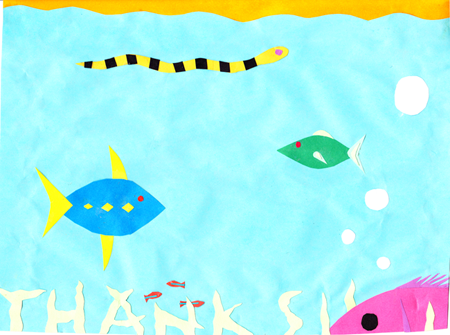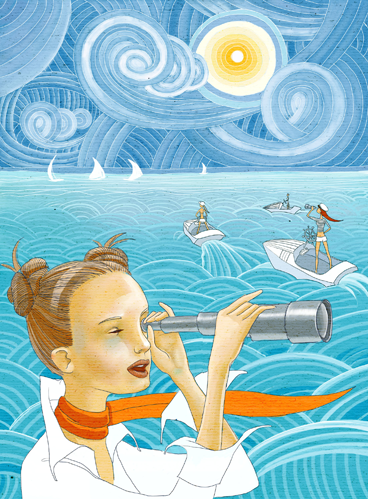I-Search
Four things I’ve learned from an 8th-grade writing project:
1. I am a project person. Having a project is good. So is having a structure.
For the last year, as one of more than 500 volunteer coaches with WriterCoach Connection, I’ve enjoyed coaching students in their classroom writing assignments. I’ve especially enjoyed coaching eighth graders in their final project, the I-Search, a challenging, three-month long investigation. I love everything about the I-Search.I love that it enables students to experience writing as a process and guides them in every aspect of the process: asking questions, brainstorming, creating a proposal and a research plan, keeping a journal, writing about what they’ve learned, building drafts from journal entries, interviewing experts, evaluating and citing sources, doing hands-on learning, writing about their topic in different forms—creating a business letter and a short story, for instance—meeting deadlines.
I love how the project is paced, allowing students to focus on one part at a time, learning as they go, instead of trying to grasp the whole thing at once. I love that it culminates in their creating a ten-page paper and a five-minute in-class presentation, drawing from all the material they’ve collected, knowledge they’ve gained, and writing they’ve done over the course of three months. I love that they have to keep all their notes and drafts in a binder. Most of all, I love that the I-Search starts with their interests and questions, that the entire project is driven by their inquiry—just the way I think all writing projects should be, if they could, in an ideal world.
From my perspective as a professional writer, the I-Search is sheer genius. It offers a structure, complete with worksheets, that I could adapt to my own projects to help me stay on track and that students can certainly use and build on throughout their lives. What a delight to see how the I-Search works for these eighth-graders and how they rise to the challenge!
2. It’s good to start with a question. I have a question: Why am I suddenly writing in a new way?
One of the things that’s going on in my writing life right now is that a memoir is breaking loose. I’m writing about personal experiences that happened when I was 17; I’m looking back from that age to early childhood and forward to young adulthood. I think I may be writing a coming-of-age story. I’m not sure what form this work will take; I just know that I have to write it now.
One of my writer friends has told me, over the years, in jest, “If you don’t write about this, I’m going to write about it. I’m going to steal it from you. It’s a great story.” So suddenly the young writer in me is asserting her voice. Is that because I’ve held onto this material my whole life and can’t hold onto it any longer? Or is that because I’m working with young writers, and as I coach them, I’ve begun to remember my own experiences as a young person? Or is it because I have a central I-Search question that raises question after question that I need to explore?
Oh, how I wish I’d had such a thoughtfully crafted writing project when I was in eighth grade. It wasn’t until I took AP English in high school that I really began to learn about the craft of writing. Process was not something we talked about there or in my college writing classes; process was not all that well modeled in our school projects either, not in high school or college. Thank goodness student writing instruction has evolved so that the focus now is on both skill building and process.
3. Teaching and coaching help me refine my understanding of the writing process. I love the inventiveness of the process. It’s all about discovery.
My focus while I coach is on whatever the student needs in the moment, and I find out by asking how I can help in the twenty or thirty minutes that we have together. What has the teacher asked for? What part of the assignment is the student working on? What does he want to focus on now? What does she think of her draft? How might she go about revising it? Sometimes students have a clear idea of what they want to work on; sometimes they don’t, in which case I can look at their draft, if they have one, or ask additional questions about their research or process.
Ordinarily, I start with praise. That’s good practice when giving feedback to any writer, young or old. It’s what we did in feedback groups in graduate school. It’s part of the training coaches receive from WriterCoach Connection. If I sometimes forget, when looking at a developed draft, to start with praise for their work and go too quickly to an issue of technique or craft or logic that I think they might want to explore—revising a sentence for economy of language or rearranging paragraphs to improve the flow—I stop myself mid-sentence to explain.
“This is good work,” I’ll say. “You’ve done a great job. That suggestion I just made—that’s advanced stuff. It’s the kind of revision I might do on my own work. I’m always asking myself, when I revise, ‘Did I say this clearly enough? Did I say what I mean?’ So tell me, how do you feel about this paragraph? What do you think about the idea of tweaking it?” Then I wait. The student almost always has ideas about what to do next.
One day a student asked me three times, “What should I do? How should I do this?” I could have made suggestions, but I could see that he was looking at me as the expert, and the point of coaching is to help students discover their own expertise. So I asked him, “What do you think you should do? How do you want to handle it? Think about who your audience is and what you want to say.” That inspired him to start writing. He was writing a short story that day. He was writing fast. Suddenly he looked up and said, “What should I name his brother?” This made me laugh. I threw out a couple of names. We did a little brainstorming together, then he continued writing. Since he was writing, I opened my notebook and starting writing too.

Handcrafted thank you card from one of the eighth-graders I coached this year through WriterCoach Connection. Original image by student; photo by me.
Another student whose I-Search project was about tarantulas didn’t know where to begin with his story. I said, “Let’s play a ‘what-if’ game. What if there was a character who was afraid of tarantulas? Who would this character be?” I asked a series of questions about character, place, circumstance, and conflict. We had an animated conversation. He had fun inventing, and in twenty minutes, he had a story outline. “This is what writing is all about,” I told him, “asking questions and seeking answers. You can use the technique of asking questions for academic writing, too—for any kind of writing. In fact the I-Search is based on investigating questions. What a great way to approach learning.”
Each student has different gifts. They are funny, inventive, organized, sensitive, curious. I like the work these students produce. I like helping them figure out how to make their drafts better. I like learning from them as they show me how they approach writing.
One student changed his I-Search topic a couple of weeks into the project, which could have made it difficult for him to keep up with the work, since one phase builds on the next, but he did just fine, because, as it turns out, he knew about the I-Search from older kids in his neighborhood and had begun assembling a short list of potential topics—things he really wanted to learn about—years before he got to eighth grade.
While I like to plan ahead, too, that’s a skill I developed a couple of years into my career, not as a kid. I was mighty impressed to see this quality in a student and equally impressed with the power of the I-Search project. It has a reputation among students. They know that to graduate from middle school and move on to high school, they have to develop and complete their own I-Search.
4. A writer is someone who writes.
Recently I finished another draft of a book I’ve been working on for a long time, a guide for women writers to overcoming self-censorship. It draws from my personal experience of transforming the nay-saying voice inside me. I’ve come to realize that that voice, commonly known as the inner critic, is not really my voice; rather, it’s the voice of the mass culture that I internalized, the voice that is particularly adept at putting women and girls down. My book presents creative practices women can use to learn how to reject the voice of the culture/critic and claim the power of their own voices.After years of working on this book, I started to feel like I might not have any other writing projects in me. I was tired. I needed a break. Coaching students on the I-Search has shown me that I do have other stories to tell and other books to write. The I in I-Search is the self, and as I used to feel when I was young, the self is infinite.
One of the students I coached, who has a gift and a passion for writing, seems to have none of the cultural conditioning that women of my generation have endured, none of the nay-saying, which gives me hope not only for her, but for her whole generation. This student has a lot of support for her writing. She and her parents know a number of well-established writers. She actively seeks out special writing programs for young people.
When she began her I-Search, she knew she wanted to focus on writing, but she didn’t have an initial question. “How do writers write?” I suggested. “What is a writer?” She answered my second question without hesitation. “A writer is someone who writes. I’m a writer.”
The simplicity of this answer astounded me. She had no sense of becoming or striving; it simply was so. And she was right. As we practice writing, we are writers. I knew that, in my head. But I had to write an entire book about overcoming self-censorship to come to the same conclusion, and on that day, when I still wasn’t sure if I had another book in me, I appreciated the Zen-like wisdom of her statement. It meant that all I had to do was go home and write.
This student decided to focus on a project, how to write a novel. It was an ambitious project for a 14-year-old and especially ambitious given the time constraints, but this was an investigation, and she really wanted to know how novel writing is done. She found out that, despite the promises some how-to books make, it’s not easy or even possible to write a novel in three months, so during this project, on advice from her classmates, she assembled a portfolio of the short pieces she’d written, and that was enough. In fact, that is the way that many writers assemble whole books, one short piece at a time.
One day this student told me that she writes in her head constantly; she narrates her experience, turning present action into stories. Then I remembered that I did the same thing when I was young. I’d forgotten about that until she mentioned it. This made me wonder if other writers began their writing journeys with self-narration. It made me think about how the self-narrative voice changes as we grow up, how we lose touch with that voice, and how we recover it. I remembered how preoccupied I used to be with my voice, how I used to write about my voice as if it were something I had to protect, something that, if I wasn’t careful, could be stolen from me.
The other night I picked up my copy of Writing Alone and with Others, Pat Schneider’s guide to the method she developed of writing and teaching writing—the Amherst Writers method. Schneider’s focus is one hundred percent on process, and her method has helped countless writers tell their stories. I’ve owned this book for years but never looked at it closely. I figured my method of teaching writing was quite a bit like hers, so what did she have to teach me?
On this evening, I decided to start at the beginning. I was delighted to see the title of Schneider’s introduction: “A Writer Is Someone Who Writes.” She begins her intro with a story of recovering a diary she wrote when she was a child. Ten minutes into my reading, a few pages into her story, I was suddenly compelled to reach for my notebook and pen and just as suddenly writing in a new way, the way I used to write in my journal when I was young, with no sense of limitation, no worries about past or future, just letting the words and stories come to me without anxiety or self-judgment.
There I sat in the big brown chair in my living room, both legs flung over the arm of the chair, writing in a notebook with a pen, just the way I used to sit and write in the big gray chair in my bedroom when I was a kid. I heard my seventeen-year-old voice narrating my experience in my head, loud and clear and animated, while the critical cultural voice was silent, vanquished, kaput, and I happily wrote down everything my seventeen-year-old voice said.
That, I believe, was the start of my I-Search—my new I-Search, maybe a new book. I was writing again, really writing. That, I have learned and know in my bones, is just what a writer does.
If you teach writing, do you find that teaching helps you as a writer? How so? Have you ever done an I-Search or taught an I-Search? What’s your favorite way to teach young people writing process?




I love this piece as much as you love teaching eighth graders using the I Search process. I have long contended that if you don’t learn anything from your students it is questionable whether they are learning anything worthwhile. Obviously you are on a roll. Keep rolling. Thanks to you I have written short scenes for my memoirs every day this week.
Thanks, Dad! I am so glad to hear that you’ve been writing and I’m looking forward to hearing your work. You have some great stories to tell.